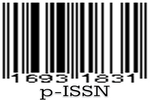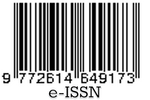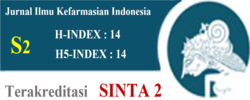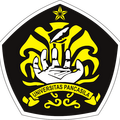The Potential of Tradescantia Spathaceae Leaves Infusion as Sunscreen Gel Use Spectrophotometric UV-Vis Method
Abstract
The boat lily (Tradescantia spathaceae) leaves have purple pigments produced from anthocyanins. This compound is thought to have sunscreen activity. The purpose of this study was to test the potential of sunscreen for both infusion and gel preparations of boat lily leaves in vitro using a spectrophotometric UV-Vis and determine its stability. The gel formula with a concentration of 12.5%; 25% and 50%. The parameters observed in this study were organoleptic, homogeneity, pH, dispersion test, viscosity, the value of Sun Protection Factor (SPF), and storage time test. The greater concentration of infusions, the lower the viscosity and inversely proportional to the dispersion value. The preparation has a good pH and follows the skin’s pH, which is in the range of 5.87-7.00. The boat lily infusion has SPF values: 3.64; 6.83, and 12.73. In comparison the boat lily gel has SPF in succession, namely: 7.48; 9.55, and 14.06. Based on the research, it can be concluded that the infusion of the boat lily can be made in a gel dosage form. Both infusion and infusion gel preparations of pineapple shellfish at a concentration of 12.5% to 50% have low protective power and boat lily infusion gel is unstable during storage.
References
2. Cefali LC, Ataide JA, Moriel P, Foglio MA, Mazzola PG. Plant-based active photoprotectants for sunscreens. Int JCosmet Sci. 2016;38(4):346–53.
3. Kockler J, Oelgemöller M, Robertson S, Glass BD. Photostability of sunscreens. J Photochem Photobiol C Photochem Rev. 2012;13(1):91–110.
4. Diffey B. Human Exposure to ultraviolet radiation. In: Photodermatology. London; 1999. p. 5–21.
5. Tahir I, Jumina YI. Analisis aktivitas perlindungan sinar UV secara in vitro dan in vivo dari beberapa senyawa ester sinamat produk reaksi kondensasi benzaldehida tersubstitusi dan alkil asetat. In: Makalah pada Seminar Nasional Kimia XI Yogyakarta Jurusan Kimia FMIPA UGM. 2002.
6. Rai R, Shanmuga SC, Srinivas CR. Update on photoprotection. Indian J Dermatol. 2012;57(5):335.
7. Ahmad I, Mulawarman U. Uji stabilitas formula krim tabir surya ekstrak umbi bawang. 2017;(December 2013).
8. Tabrizi H, Mortazavi SA, Kamalinejad M. An in vitro evaluation of various Rosa damascena flower extracts as a natural antisolar agent. Int J Cosmet Sci. 2003;25(6):259–65.
9. Ratnasari S, Suhendar D, Amalia V. Studi potensi ekstrak daun Adam Hawa (Rhoeo Discolor) sebagai indikator titrasi asam-basa. Chim Nat Acta. 2016;4(1):39–46.
10. Cumpelik BM. Analytical procedures and evaluation of sunscreens. J Soc Cosmet Chem. 1972;23(6):333.
11. Verma A, Singh S, Kaur R, Jain UK. Topical gels as drug delivery systems: A review. Int J Pharm Sci Rev Res. 2013;23(2):374–82.
12. Rowe RC, Sheskey P, Quinn M. Handbook of pharmaceutical excipients. Libros Digitales-Pharmaceutical Press; 2009.
13. Lubrizol. Thickening properties [Internet]. 33. Pharmaceutical Bulletin 6. 2011 [cited 2019 Nov 3]. p. 6. Available from: https://www.lubrizol.com/-/media/Lubrizol/Life-Sciences/Documents/Literature/Bulletin/Bulletin-06---Thickening-Properties.pdf.
14. Deng J, Yang H, Capanoglu E, Cao H, Xiao J. Technological aspects and stability of polyphenols. In: Polyphenols: Properties, recovery, and applications. Elsevier; 2018. p. 295–323.
15. BPOM RI. Pedoman teknologi formulasi sediaan berbasis ekstrak. Vol I Jakarta Direktorat OAI, Deputi II, Badan POM RI Hal. 2012;1–3.
16. Farnsworth NR. Biological and phytochemical screening of plants. J Pharm Sci. 1966;55(3):225–76.
17. Harborne JB. Metode fitokimia: Penuntun cara modern menganalisis tumbuhan. Bandung Penerbit ITB. 1987;78.
18. JdS M, Breder MNR, MCdA M, Azulay RD. Determinaçäo do fator de proteçäo solar por espectrofotometria. An Bras Dermatol. 1986;61(3):121-4.
19. Donglikar MM, Deore SL. Sunscreens : A review. 2016;8(3):171–9.
20. Dutra EA, Almança D, Kedor- ERM, Inês M, Miritello R. Determination of sun protection factor (SPF) of sunscreens by ultraviolet spectrophotometry. 2004;40(Equation 1).
21. Arista Y, Kumesan N, Yamlean PVY, Supriati HS. Formulasi dan uji aktivitas gel antijerawat ekstrak Umbi Bakung (Crinum asiaticum L.) terhadap bakteri Staphylococcus aureus secara in vitro. Pharmacon J Ilm Farm – UNSRAT. 2013;2(02):2302–493.
22. Sayuti NA. Formulasi dan uji stabilitas fisik sediaan gel ekstrak daun ketepeng cina (Cassia alata l.). J Kefarmasian Indonesia. 2015;5(2):74–82.
23. Makka A. Karakterisasi sediaan dan uji penetrasi natrium diklofenak dengan sistem mikroemulsi dalam gel HPMC 4000 (mikroemulsi w/o dengan surfaktan span80-tween 80: kosurfaktan isopropanol= 4:1). Universitas Airlangga; 2013.
24. Dantas MGB, Reis SAGB, Damasceno CMD, Rolim LA, Rolim-Neto PJ, Carvalho FO, et al. Development and evaluation of stability of a gel formulation containing the monoterpene borneol. Sci World J. 2016;2016.
25. Europe C. Guidelines on stability testing of cosmetic products. 2004.
26. Rignall A. ICHQ1A (R2) stability testing of new drug substance and product and ICHQ1C stability testing of new dosage forms. ICH Qual Guidel an Implement Guid. 2017;3.
27. da Silva V V, Ropke CD, de Almeida RL, Miranda D V, Kera CZ, Rivelli DP, et al. Chemical stability and SPF determination of Pothomorphe umbellata extract gel and photostability of 4-nerolidylcathecol. Int J Pharm. 2005;303(1–2):125–31.
28. Martinez SL. Chemical composition of the leaves Rodeo discolor medical plant distribute in central America and Mexico using X-Ray diffraction spectroscopy X-Ray diffraction Rhoeo discolor. SYLWAN. 2016;160(February 2017):165–77.
29. De M, Arias-castro C, Rodr M, Hern S. Aqueous crude extract of Rhoeo discolor , a Mexican medicinal plant, decreases the formation of liver preneoplastic foci in rats. 2008;115:381–6.
30. Sánchez Y, Ayora-talavera G, Rincón R, Gutiérrez FA, Meza R, Winkler R, et al. The flavonoid fraction from Rhoeo discolor leaves acts antiviral against the flavonoid fraction from Rhoeo discolor leaves acting as antiviral against influenza A Virus. 2017;(July).
31. Tan JBL, Lim YY, Lee SM. Rhoeo spathacea (Swartz) Stearn leaves, a potential natural food colorant. J Funct Foods. 2014;7:443–51.
32. British Association of Dermatologists. Sunscreen and sun safety factsheet [Internet]. 2013 p. 1–9. Available from: https://www.bad.org.uk/shared/get-file.ashx?id=3917&itemtype=document.
33. Gradinaru G, Biliaderis CG, Kallithraka S, Kefalas P, Garcia-Viguera C. Thermal stability of Hibiscus sabdariffa L. anthocyanins in solution and in solid state: effects of copigmentation and glass transition. Food Chem. 2003;83(3):423–36.
34. Özgür MÜ, Çimen E. Ultrasound-assisted extraction of anthocyanins from red rose petals and new spectrophotometric methods for the determination of total monomeric anthocyanins. J AOAC Int. 2018;101(4):967–80.
35. Calogero G, Bartolotta A, Di Marco G, Di Carlo A, Bonaccorso F. Vegetable-based dye-sensitized solar cells. Chem Soc Rev. 2015;44(10):3244–94.
36. Ebrahimzadeh MA, Enayatifard R, Khalili M, Ghaffarloo M, Saeedi M, Charati JY. Correlation between sun protection factor and antioxidant activity, phenol and flavonoid contents of some medicinal plants. Iran J Pharm Res IJPR. 2014;13(3):1041.
37. Day RA, Underwood AL. Analisis Kimia Kuantitatif Edisi Keenam. Jakarta: Erlangga. 2002;
38. Dachriyanus D. Analisis struktur senyawa organik secara spektroskopi. LPTIK Univ Andalas. 2004;
39. Sidiq HBHF, Apriliyanti IP. Evaluasi sifat fisik dan uji iritasi gel ekstrak kulit buah Pisang (Musa acuminata Colla). JCPS (Journal Curr Pharm Sci. 2018;2(1):131–5

This work is licensed under a Creative Commons Attribution-NonCommercial-ShareAlike 4.0 International License.
Licencing
All articles in Jurnal Ilmu Kefarmasian Indonesia are an open-access article, distributed under the terms of the Creative Commons Attribution-NonCommercial-ShareAlike 4.0 International License which permits unrestricted non-commercial used, distribution and reproduction in any medium.
This licence applies to Author(s) and Public Reader means that the users mays :
- SHARE:
copy and redistribute the article in any medium or format - ADAPT:
remix, transform, and build upon the article (eg.: to produce a new research work and, possibly, a new publication) - ALIKE:
If you remix, transform, or build upon the article, you must distribute your contributions under the same license as the original. - NO ADDITIONAL RESTRICTIONS:
You may not apply legal terms or technological measures that legally restrict others from doing anything the license permits.
It does however mean that when you use it you must:
- ATTRIBUTION: You must give appropriate credit to both the Author(s) and the journal, provide a link to the license, and indicate if changes were made. You may do so in any reasonable manner, but not in any way that suggests the licensor endorses you or your use.
You may not:
- NONCOMMERCIAL: You may not use the article for commercial purposes.
This work is licensed under a Creative Commons Attribution-NonCommercial-ShareAlike 4.0 International License.





 Tools
Tools





















